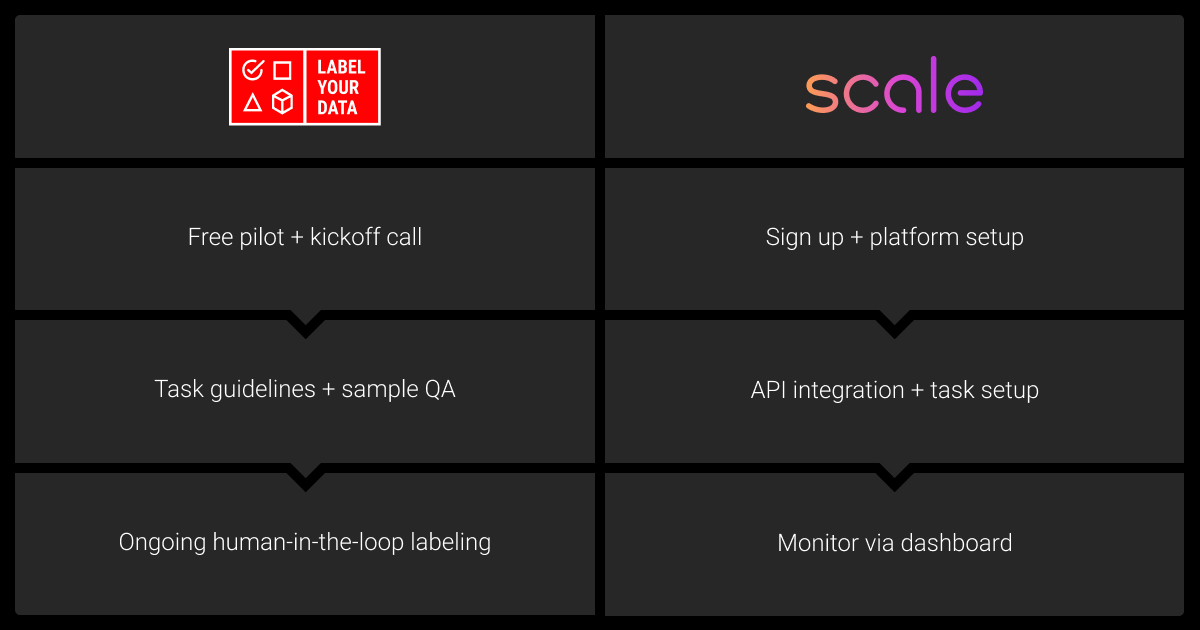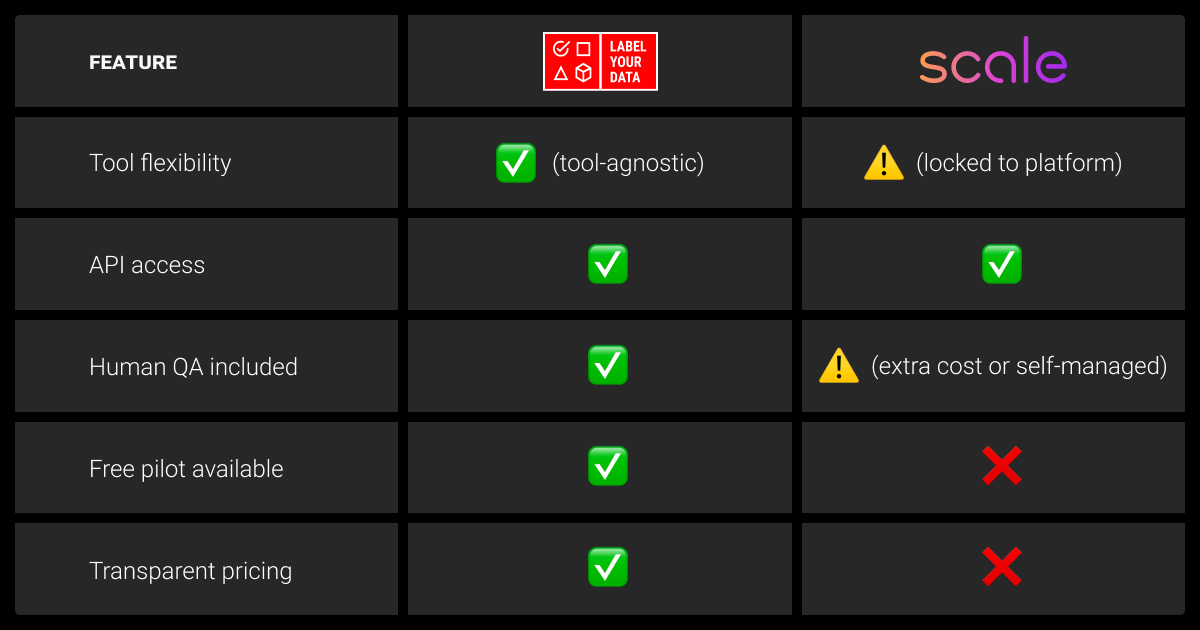Label Your Data vs Scale AI: For ML Teams Evaluating Vendors
Table of Contents
- TL;DR
- Side-by-Side: Label Your Data vs Scale AI
- Evaluation Criteria Breakdown
- How Good Is the Labeling Quality?
- How Flexible Is the Service?
- What’s the Annotation Platform Like?
- How Easy Is Integration?
- What’s the Pricing Like?
- Can They Handle Your Volume and Deadlines?
- Label Your Data vs Scale AI: Which Use Cases Are a Good Fit?
- About Label Your Data
-
FAQ
- What is the difference between managed annotation services and self-serve platforms?
- Can I run a free pilot before committing to a vendor?
- Is Scale AI a data labeling company?
- What are the disadvantages of using Scale AI?
- How accurate is Scale AI?
- Who are Scale AI competitors?
- Who is CEO of Scale AI?

TL;DR
- Scale AI is built for high-volume, enterprise pipelines but often lacks transparency, pricing clarity, and hands-on support.
- Label Your Data combines a managed service and self-serve platform, giving ML teams more control over formats, QA, and timelines.
- Scale AI doesn’t publicly share platform features, review systems, or quality benchmarks, which limits buyer confidence.
- Label Your Data offers clear data annotation pricing, free pilots, and is rated 4.9/5.0 on G2 and Clutch with 40+ verified reviews.
- For ML teams focused on flexibility, quality, and transparency, Label Your Data is the best data annotation company to work with.
Side-by-Side: Label Your Data vs Scale AI
At a glance, Label Your Data and Scale AI offer two different approaches to data annotation. One leans into flexible human-in-the-loop services, the other into automation and scale.
Here’s a quick side-by-side:

- Label Your Data provides a platform and managed services with human-in-the-loop workflows, expert QA, and custom format support. A free pilot allows you to test things out.
- Scale AI is an enterprise-focused platform with an automation-first model, built around APIs and high-throughput pipelines. No free trial, and minimum volumes may apply.
Want a deeper look? Let’s break it down by key evaluation factors next — or skip ahead to the Scale AI review or Label Your Data review.
Evaluation Criteria Breakdown
When choosing a data annotation company, ML teams tend to evaluate five categories:
- Labeling quality and QA: Is the data accurate? Do edge cases get flagged? Can you trust the outputs for training?
- Service flexibility: Can the vendor adapt to your workflows, labeling guidelines, or support needs?
- Annotation platform: Is the UI usable for your team? Are there features for reviewing, editing, or versioning annotations?
- Integration options: Does the vendor support your required formats, SDKs, or API access?
- Pricing and delivery: How transparent is the pricing model? Can they deliver at your needed scale or timeline?
Each of these areas affects whether your team will waste time fixing labels or move faster with reliable training data. Let’s explore how Label Your Data vs Scale AI compare across these factors.
How Good Is the Labeling Quality?
What accuracy and QA checks you can expect from each vendor.
Label Your Data Quality
Label Your Data uses a human-in-the-loop approach with built-in expert QA. Each project includes multi-level checks by a second annotator, a QA lead, or an account manager. You can define quality rules up front, such as required IoU thresholds or acceptable error margins for rare classes.
Annotators can leave notes, and clients get reviewed samples with QA comments. Edge cases and complex inputs like multi-band imagery are supported with targeted annotator training. This setup is designed for transparency, consistency, and project-specific accuracy metrics.Trusted by ML teams worldwide, Label Your Data holds a 4.9/5.0 rating on G2 (15 reviews) and 4.9/5.0 rating on Clutch (26 reviews), reflecting consistently high satisfaction with labeling quality and support.
Scale AI Quality
Scale AI uses automated QA pipelines combined with spot checks. For standard tasks like boxes or polygons, quality is controlled via consensus scoring and model confidence filters. QA scales well when the task is clearly defined and repeatable.
But for niche domains or tasks that need ongoing calibration, Scale’s automation can fall short unless you build custom workflows. Manual review is possible, but more limited on lower-tier plans. It’s a better fit for high-volume teams with strict labeling rules and minimal edge cases.The company holds a 5.0 G2 rating but from just one review, offering limited visibility into real-world service quality.
Label Your Data built a feedback-driven iteration process into our contract; they flagged unclear taxonomy and proactively recommended fixes. Scale AI followed instructions well but required us to discover labeling errors post hoc, leading to reactive cycles. In production, this upstream feedback from Label Your Data saved us retraining time and budget. According to a recent study by Google, proactive feedback loops consistently outperform reactive correction cycles in terms of efficiency and accuracy.
How Flexible Is the Service?

Can they adapt to your workflow, support needs, and data edge cases?
Label Your Data’s Custom Fit
Label Your Data works like an extension of your ML team. You can define edge-case rules, request task-specific training, or set up custom QA workflows. Support is handled by real project managers, not chatbots, with fast turnaround on adjustments.
The Label Your Data team is also format-agnostic and can handle non-standard data types or unusual label formats. A dedicated Slack or email channel is typically available for faster iteration cycles.This level of data annotation services is especially useful when your projects don’t fit into a generic labeling template or when you’re working with niche modalities like LiDAR, geospatial annotation, or sequential image pairs.
Scale AI’s Enterprise Focus
Scale AI is designed for high-throughput annotation, which often means strict process templates. For common tasks like bounding boxes, image recognition, or semantic segmentation, onboarding is fast and well-structured.
But customizing tasks, for example, changing instructions mid-project or handling overlapping label taxonomies, often requires enterprise-tier access or deeper negotiation with the Scale AI team.
Their support runs through account managers and a formal escalation process. You’ll get consistency, but it may be harder to adapt on short timelines unless you're on a high-value contract.
Label Your Data stood out for its white-glove service and flexibility. Unlike Scale, which tends to operate with a more rigid pipeline, Label Your Data gave us direct access to project managers and allowed tighter iteration cycles. For a production use case where accuracy on edge cases was critical — think overlapping annotations and domain-specific labeling—their willingness to tailor QA processes and retrain annotators mid-stream made a big difference.
What’s the Annotation Platform Like?
Is the tooling usable for your team? Any review or version control?
Label Your Data Platform for Computer Vision
Label Your Data’s data annotation platform is designed for ML teams that need full control over their computer vision annotation workflows. You manage the entire project from one dashboard: no minimum commitment, no setup delays.
Key features include:
- Multiple annotation types: Bounding boxes, polygons, cuboids, keypoints, instance/semantic/panoptic segmentation
- Project tracking: Monitor annotation progress in real time
- Instruction generator: Built-in template to create clear labeling guidelines
- Cost calculator: Estimate your project budget before uploading data
- Free pilot: Test the workflow on 10 frames at no cost
- API access: Automate data upload/download and integrate with your ML stack
- Team access: Set user roles and manage teams easily
It’s especially useful for ML teams, startups, and research groups that need flexibility, transparency, and direct oversight.
Scale AI Platform and Tools
Scale AI’s platform is built into its Nucleus ecosystem and focuses on large-scale workflows with automation baked in.
Highlights include:
- Auto-labeling and model-in-the-loop tools
- Annotation QA dashboards for quality tracking
- Collaborative queues for distributed team management
- SDKs and APIs for deep integration with production pipelines
While powerful, Scale’s interface and configuration options can be overkill for smaller teams or less technical users. You also won’t get cost estimates or transparent settings upfront without contacting sales.
How Easy Is Integration?
Can you plug it into your stack easily (API, formats, SDKs)?
Label Your Data Integration Options
Label Your Data provides straightforward integration for teams that want to plug annotation directly into their ML workflows.
- REST API for upload/download and task management
- Supports common formats like COCO, YOLO, Pascal VOC, and GeoJSON
- Compatible with major ML toolkits (PyTorch, TensorFlow, Detectron2, etc.)
- No vendor lock-in; raw data and annotations are fully exportable
- Works well with in-house pipelines and small-scale tooling setups
For teams that prefer direct access without a complex SDK or enterprise gating, it’s a lean, accessible option.
Scale AI Integration Options
Scale AI offers a robust API and SDK library, but access is gated behind sales and onboarding.
- Scale API supports detailed control of task queues and label management
- Offers client SDKs in Python and other languages
- Supports COCO, YOLO, and custom formats; though formatting may require adjustments
- Best suited for high-volume pipelines that rely on automated routing and QA
- Requires more setup and internal dev time to configure at first use
Scale’s integration is powerful but less accessible for smaller teams that need fast setup or out-of-the-box compatibility.
What’s the Pricing Like?
Is pricing transparent? Are pilots or pay-as-you-go models available?
Label Your Data Pricing
Label Your Data uses a flexible, transparent pricing structure designed for teams of any size or project type. You can pick from three engagement options:
- On-demand: Best for ad-hoc tasks or projects with unpredictable data volumes
- Short-term: Ideal for research, academic teams, or MVP/POC projects with a fixed dataset
- Long-term: Tailored for enterprises, HITL validation loops, or governments with recurring data needs
Key benefits:
- Pay-as-you-go pricing with no upfront commitments
- Free cost calculator to estimate project cost instantly
- Free pilot available to validate quality before scaling
- Starts at just $100 depending on task and volume
Explore the data annotation pricing options and choose the model that fits your labeling workflow.
Scale AI Pricing
Scale AI does not publish its pricing. All costs are determined through a sales process.
- No pricing information is available on the website
- Typically requires volume commitments and custom contract negotiation
- No free pilot publicly offered
- Enterprise-focused pricing structure may not suit lean teams or one-time projects
For budget-conscious teams or those needing instant cost visibility, Scale’s lack of public pricing can be a blocker.
Can They Handle Your Volume and Deadlines?
Do they deliver fast enough and scale when needed?
Label Your Data Delivery
Label Your Data supports both high-volume enterprise pipelines and smaller academic or POC projects. Their delivery model combines human-in-the-loop workflows with scalable workforce sourcing; either crowdsourced or in-house depending on the need.
- Capable of handling tens of thousands of annotations per day
- No minimum volume required for project launch
- SLA-driven delivery for long-term or recurring workflows
- Dedicated project manager for real-time support and scaling
Label Your Data is often selected by teams with tight deadlines or fast-changing requirements due to its responsiveness and flexible resource model.
Scale AI Delivery
Scale AI is built for enterprise workloads but may not be the best fit for teams without large and steady pipelines. The focus is on automation and model-assisted labeling, which helps reduce turnaround time at scale.
- Strong performance for high-volume, API-driven labeling pipelines
- Less flexibility for teams that need quick starts or variable volumes
- Review cycles and throughput optimized for teams already familiar with their tools
While Scale AI scales well technically, its delivery model is better suited to organizations already embedded in enterprise MLOps.
I've worked with both Scale AI and Label Your Data on production-level ML projects, and each has its strengths. Scale AI stands out for its speed and ability to handle complex, large-scale datasets. Label Your Data excels in providing more granular, customizable labeling options. For larger projects, Scale AI is more efficient, but for projects requiring more precision or tailored workflows, Label Your Data offers better flexibility.
Label Your Data vs Scale AI: Which Use Cases Are a Good Fit?
Not all annotation vendors work equally well for all project types. Here’s a quick side-by-side to help you decide which fits your workflow, budget, and data complexity:

If you’re looking for a flexible, cost-effective vendor that supports custom formats, edge cases, and smaller projects, Label Your Data is the better fit, especially with its free pilot and high user ratings.
For large-scale, standardized annotation pipelines that rely on heavy automation and API-first integration, Scale AI might suit enterprise teams with the budget and internal resources to manage QA in-house.
Choose based on how much control, visibility, and support you want across your data labeling workflow.
About Label Your Data
If you choose to delegate data annotation, run a free data pilot with Label Your Data. Our outsourcing strategy has helped many companies scale their ML projects. Here’s why:
Check our performance based on a free trial
Pay per labeled object or per annotation hour
Working with every annotation tool, even your custom tools
Work with a data-certified vendor: PCI DSS Level 1, ISO:2700, GDPR, CCPA
FAQ
What is the difference between managed annotation services and self-serve platforms?
Managed annotation services provide end-to-end support, including trained annotators, project managers, and QA workflows. In contrast, self-serve platforms let ML teams upload data, label it using internal or freelance teams, and manage the workflow independently.
Can I run a free pilot before committing to a vendor?
Yes. Some data annotation vendors like Label Your Data offer a free pilot for new customers. This lets you test data annotation quality and workflow fit before making a long-term commitment.
Is Scale AI a data labeling company?
Yes, Scale AI provides data labeling services for machine learning applications. Their offering includes managed services and APIs for labeling images, text, 3D data, and video, with a focus on automation and scalability for large enterprise teams.
What are the disadvantages of using Scale AI?
Common concerns include limited pricing transparency, high minimum volumes, and a lack of flexibility for smaller teams or research projects. With only one public G2 review, it can also be difficult to independently verify accuracy or service quality.
How accurate is Scale AI?
Scale AI claims high accuracy in enterprise use cases, but public benchmarks and detailed QA documentation are not widely available. Their G2 profile currently lists only one review, so teams often request pilot results or QA specs before committing.
Who are Scale AI competitors?
Scale AI competes with leading data annotation vendors like Label Your Data, Labelbox, CloudFactory, and SuperAnnotate. These alternatives vary in service models, pricing, annotation tooling, and support for edge-case workflows or academic use.
Who is CEO of Scale AI?
Scale AI’s interim CEO is Jason Droege. He took over in June 2025 after co-founder Alexandr Wang stepped down to join Meta as Chief AI Officer. Wang remains on the board.
Scale AI was founded in 2016 by Wang and Lucy Guo. Under Wang, the company became a leading provider of data labeling services, particularly for autonomous vehicles and defense. The leadership shift followed Meta’s acquisition of a 49% stake. Scale AI still operates independently.
Written by
Karyna is the CEO of Label Your Data, a company specializing in data labeling solutions for machine learning projects. With a strong background in machine learning, she frequently collaborates with editors to share her expertise through articles, whitepapers, and presentations.





